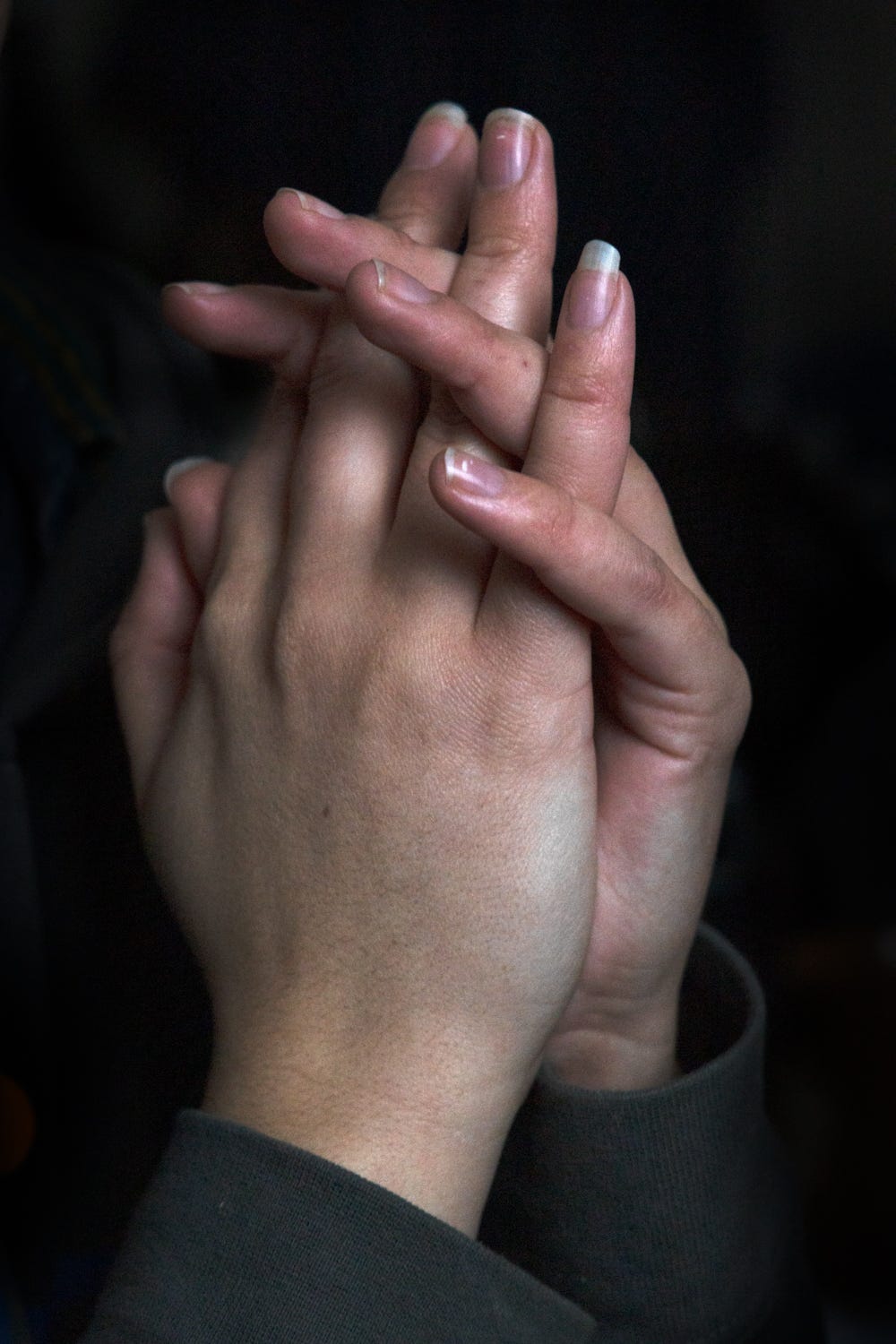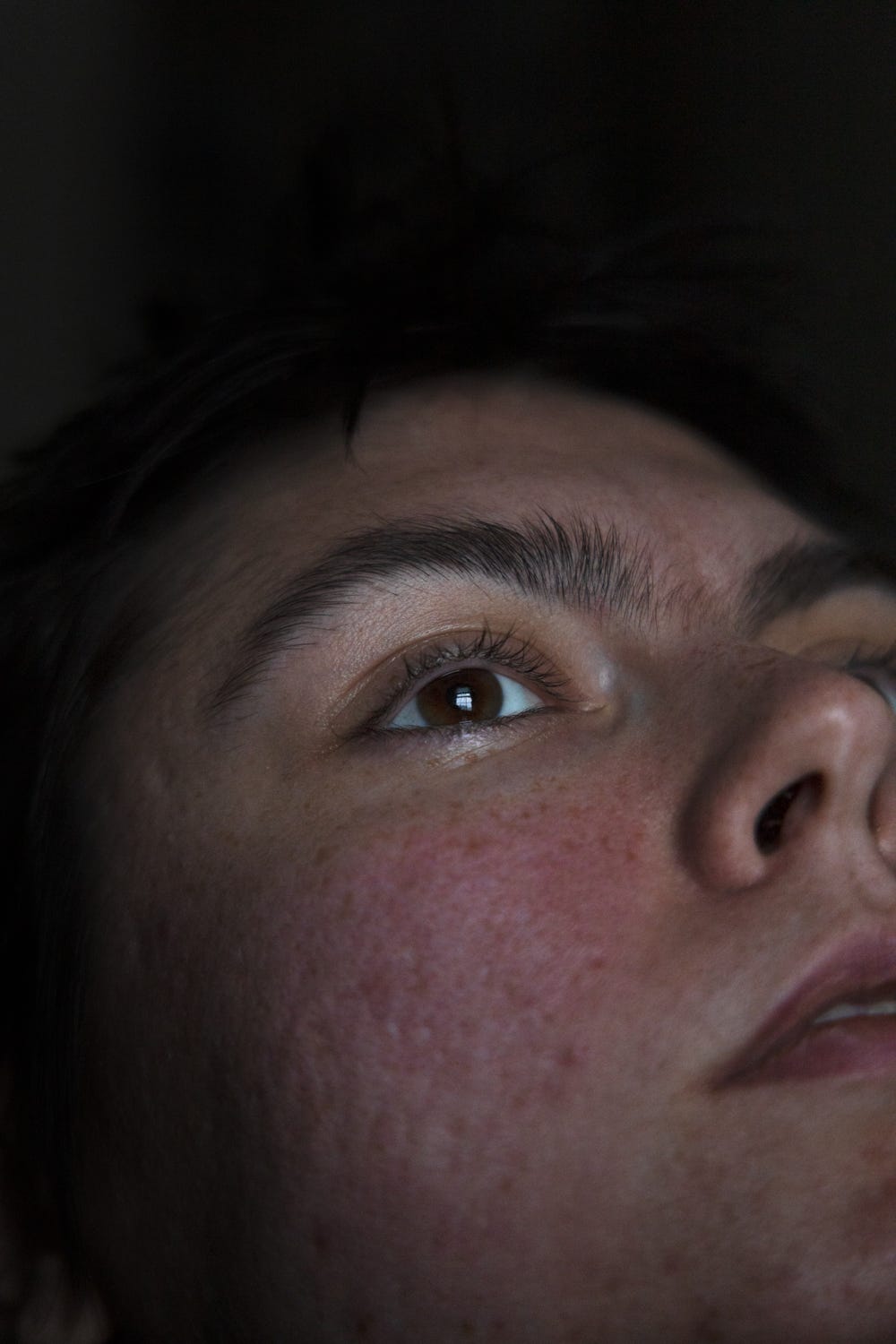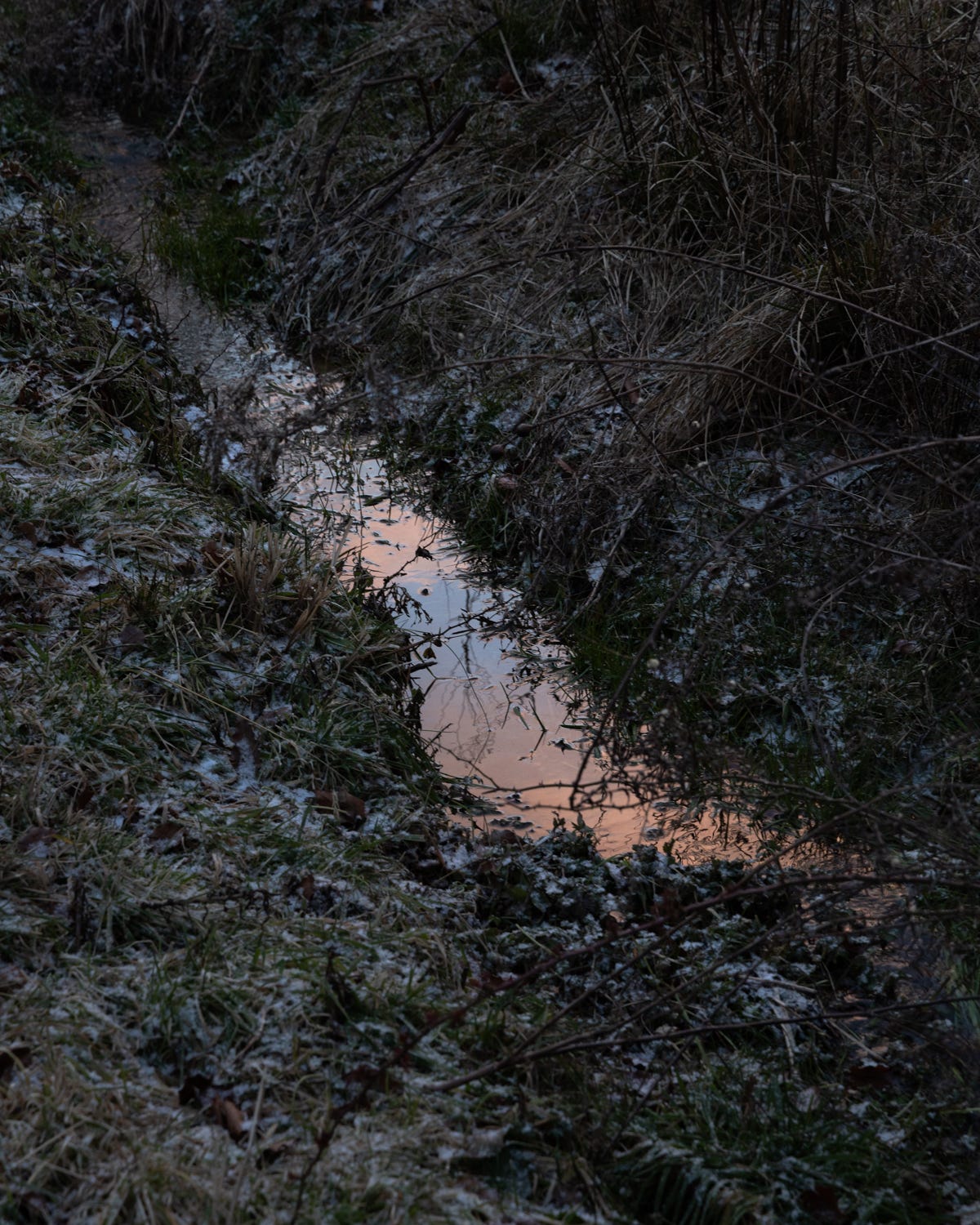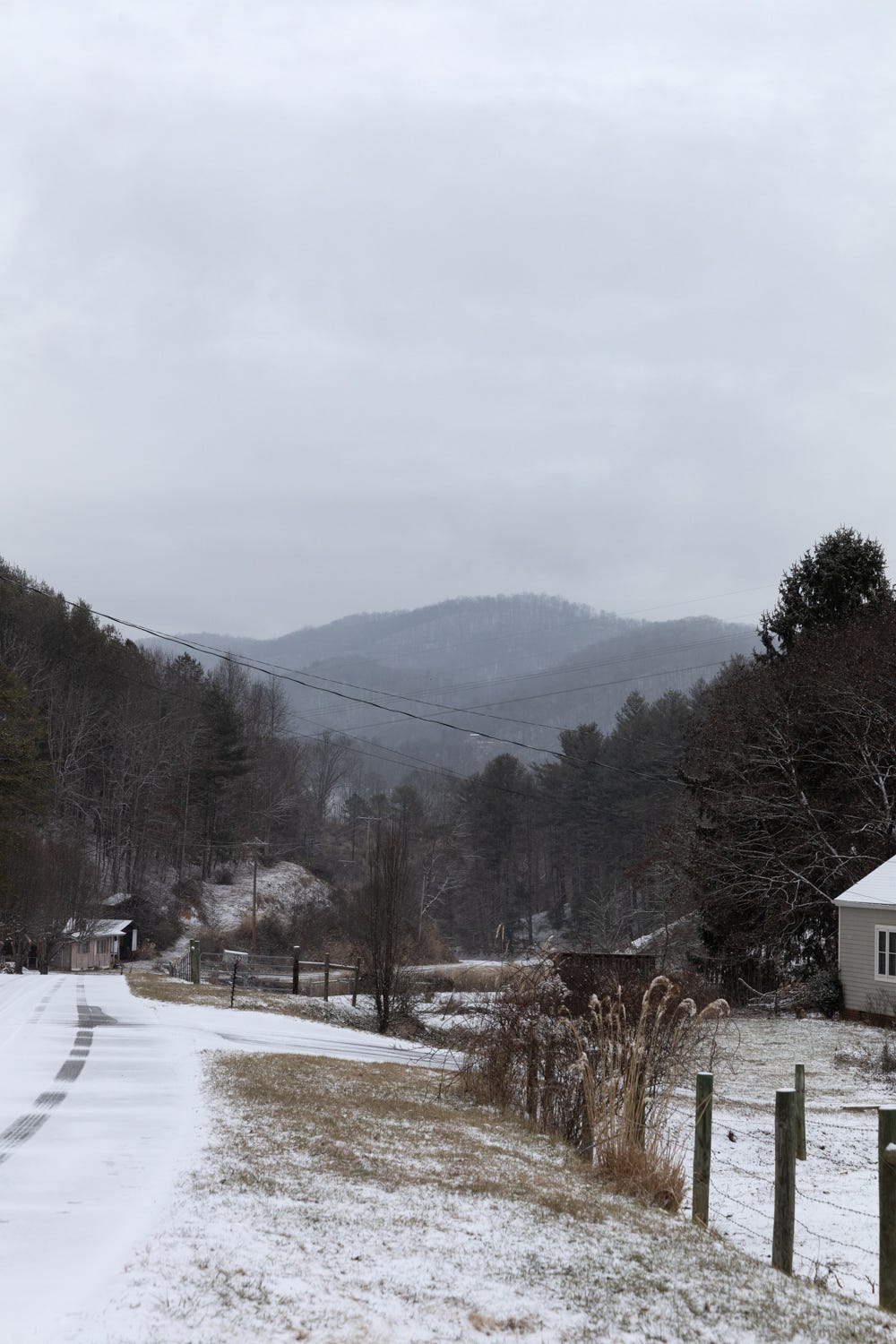I believe I have started and erased this post at least four times, gently willing my brain to write, trying to be patient when it refused. I began one of the attempts with a description of a blue crystalline morning, one of those cutting cold dawns where the air is so cold that the moisture is completely wrung from it and the daylight feels like a breath uttered across a room. Another attempt started inside of my body, all slow movement and struggle.
This morning, I rolled out of bed, pulled my polaroid emblazoned sweatpants over the thermal leggings that never leave my thighs in winter, and headed out into the grey morning. I stopped in the canning kitchen, turned off the heat system that warded off pipe freezes over the past week, said good morning to the cardinals that gather around my roommate’s bird feeder, and headed on up the hill. There was the sound of a helicopter over the hill, hidden beyond the grey wall of sky, and I stopped, watching a small white fox scamper up the hillside.
This is a morning that feels apt to reflect on this month. Grief always feels a little more appropriate on days like today, sadness and hurt appropriate when hidden from the sun. I always find depression cruelest on bright days, like my shadow is an intrusion upon the world (can you tell I’ve been extra angsty lately?). I don’t need to add my political commentary to the fires that rage on the internet. As a non-binary person, as a person who has worked for years at this point supporting people with intellectual and developmental disabilities, as a person with chronic conditions, as a person with friends in vulnerable positions, I am feeling a lot.
My partner and I took the beginning of this week to watch the Lord of the Rings extended cuts as a back to back trilogy marathon. When I was a kid, I would fall asleep to Lord of the Rings. I read both The Hobbit and the LotR trilogy, and I desperately wanted to live in that world. I remember finding comfort in the movies as a kid, though I didn’t know exactly what it was about them that I found so engaging.
Looking back, I see that my kid self wanted power to act, wanted to jump on a horse and fight against the things that I saw were unjust. I saw action, but more than that, I think I craved fellowship, and the idea that hope would be enough to overcome adversity (and honestly, I wanted to be Aragorn a little bit). I’ve returned to Lord of the Rings as an adult when I need a reminder of hope in dark times, not a glimmering, fanciful hope that aligns with positive thinking and ignoring negativity, but a dark hope, the type of hope that drives your horse forward while you scream your own death, committing your life to some small impact, some impossible thing, because the alternative of doing nothing while evil takes everything good and beautiful would be more unbearable.
I promise, I set out to write this reflection on a lighter note.
This month I haven’t been productive in the traditional sense of the word. I’ve made a handful of images, nothing I’m particularly drawn to, though holding a camera and looking feels as important as it always does to me. I have, however, been immersing myself in stories, hence watching Lord of the Rings.
An important part of Disability Justice is the idea that we need to dream better futures for all of us. This is part of what has drawn me to learning more about disability studies, this valuing of imagination as not only an important, but a vital part of building new ways of being. Selfishly, it gives me a sense of a path already laid on my feet. While I do have some concrete, hands-on-the-ground survival skills, largely from growing up working class and helping my parents whenever things would break and we had to fix it ourselves instead of calling a contractor, my reality is an often physically unreliable body. In the event of a complete societal collapse, I have a sense that my calling is outside of physically building things.
This leaves me with my mind, which, could be argued, is equally temperamental as a neurodivergent, mentally ill person, but throughout my life, my imagination has been a way to survive. I am almost hyper-aware of how much we live in stories. I am incredible at crafting a self-delusion to get through a moment of crisis, and have become more skilled in untangling the subconscious narratives that live in my body. I’ve become more and more interested over the past few years in the ways that narratives and stories shape our world in real, tangible ways. This month, stories buoyed me through.
I read The Seep by Chana Porter, The Bullet Swallower by Elizabeth Gonzalez James, and The Area X trilogy by Jeff Vandermeer this month. I became obsessed with the lore of Hollow Knight and restarted the game. I thought about the Witcher 3 (when am I not thinking about Witcher) and wished I had more time to continue my current playthrough.
I’ve read a lot of Jeff Vandermeer’s work over the years. I adore writing styles that flit outside of convention, that get at the experience of a thing. I vaguely remember reading Annihilation at some point, or maybe I just liked the cover art. I’ve seen the movie adaptation with Natalie Portman at least half a dozen times.
Area X encompasses a lighthouse on a forgotten coast, an island, a tower in the ground. It has an uncrossable border save for one door. Everyone who enters is seen, and is changed. It is as if the environment itself has become conscious, and it is expanding. The government charges the Southern Reach to study it, contain it, and expeditions are sent into Area X. The environment responds to those who enter, those who enter respond to the environment. The environment carries a history, the future is an enigma.
This trilogy highlights for me how afraid we as a culture are of change, of strange things, of a loss of self. That is simplifying a lot of the conflicts within the series, however this conflict is highlighted by the characters who each bring their own inner conflict to Area X, form their own relationship to this entity that exists wholly outside of human perception.
It is easy to see why this type of story would interest me, if you’ve spent time with my work. Transition is a constant force in my life, whether it is transition of gender, transition of health, or transition of mind-state. I feel myself exist in a very fluid state, and have experienced massive shifts in the way I move through the world.
When I first developed an intractable migraine disorder, my relationship to reality was forever altered, my perceptual senses changed in a dramatic way. I felt like I was going insane in the truest form of the word, walking through my days which took on an iridescent quality. When I was in the thick of a long migraine, the world would shimmer, I felt the edges of my body dissolve. I could lose myself in the sparkles of the river, no thoughts, no sense of self, just a keen awareness of motion moving across me, moving through me.
When I remember those times, now that I have discovered medication that manages my symptoms and my more extreme neurological and perceptual symptoms have largely subsided, I can’t help but think it is a wonder that I was functioning at all. And there is something in Vandermeer’s description of Area X that reminds me of my experience of migraine aura, this shifting into something else. I am changed for having experienced a thing.
In thinking of climate change in particular, and having lived through hurricane Helene in western North Carolina, I’ve been sitting with the idea that we are going to be changed, that the change is already occurring. There is usually grief in change, however part of me is curious, that part of me that resonates with fool’s hope and has been changed time and time again by illness. What changes if we consider that we are not only looking, but the world is looking back?
A different immersive world that has seen change is the world of Hollow Knight. (I want to do a shameless plug here to my partner’s substack who writes beautifully about video game worlds). A vessel returns from beyond the wasteland, called to a new purpose in Hallownest, the kingdom of its creation. An infection is raging, the king is dead, all is in a state of loss or being lost. Dreams have power in this kingdom in stasis.
I’m not very skilled at video games. I don’t have a lot of time to invest in them, which slows my skill progression substantially. Hollow Knight feels like a struggle because it is a demanding game. It is easy for the vessel to die, for the shade that is inside to be unleashed upon the world, a lingering regret that the player can then defeat to regain progress. But the struggle is what I love about it, the way that I can feel tiny in a world rife with danger, that there are high stakes. It takes commitment to frustration for me to play Hollow Knight.
The world is revealed piece by piece, by bits of poetry scattered throughout the kingdom, by cryptic dialogue lines shared by the rare friendly bug that is discovered. There is a hollowness to the world, a sense of something that once was, of something that is no more. To gain a better understanding of the lore, I’ve been watching Mossbag’s content on Youtube, immersing myself in not only the intricate lore of Hollow Knight, but the dedication it takes to reconstruct a story from pieces.
Actions shape the story in Hollow Knight, something I did not realize on my first playthrough. There are three possible endings (I won’t spoil them here), which makes me all the more interested in the game and its story. One of the parts of video games that I enjoy the most, and the reason I largely play role-playing games, is how narratives can react to the will of the player. The Witcher 3 comes to mind immediately as my favorite example of this, though there are so many other examples of reactive stories (who else was delighted by their changing character avatar in Fable?).
It is hard to believe that we can enact change in the real world. In Witcher 3, I love the subtlety with which early choices can ripple through the narrative many, many hours after making those decisions. The entire direction of the world can hang on a snowball fight. The subtlety reminds me that even in a world as vast as the one we inhabit, actions are ripples in a pond. Cliche, yes, but I think this month I am craving some cliche tropes.
In my own work, I am considering how story-telling can be incorporated into the delivery of photography. I shared work this past week with Kinship Photography Collective, and a member commented that the delivery of my presentation had a profound impact on how the work was received. I’ve been thinking a lot about how to get photography to go beyond communities of artists, how to encourage people who don’t normally engage with art to do so, and this comment felt really important to that.
I’ve also been working on a presentation of Upheaval, which will be held 2/20 at 7pm ET as a part of Don’t Smile’s lecture series. It is the first time I’ll be trying to present that work, and I am finding that a story is the best format that the images fit into. I hope to see you at the lecture.
All in all, this month I haven’t made very much. I started an illustration, I went on my first hike of the year, I read a lot of books. I’m going to continue hibernating, continue finding stories to carry with me into the days ahead.










We love a Hollow Knight mention!!
your description of Area X reminds me of my favorite Octavia Butler quote: “all that you touch, you change. and all that you change, changes you.”